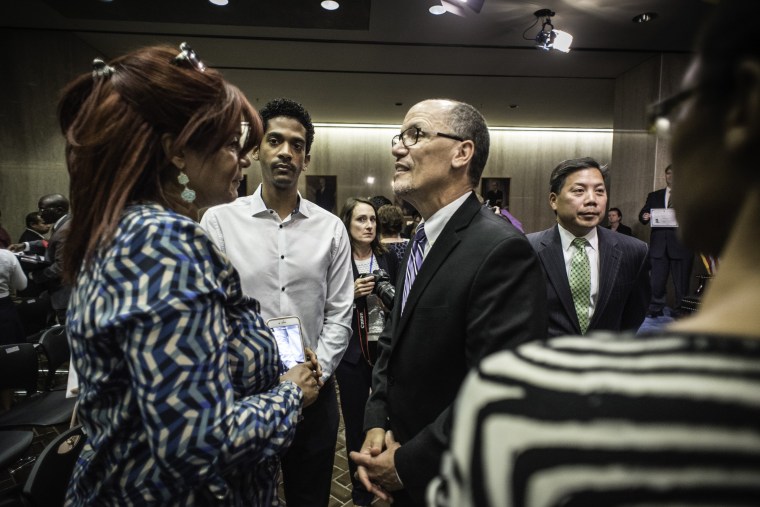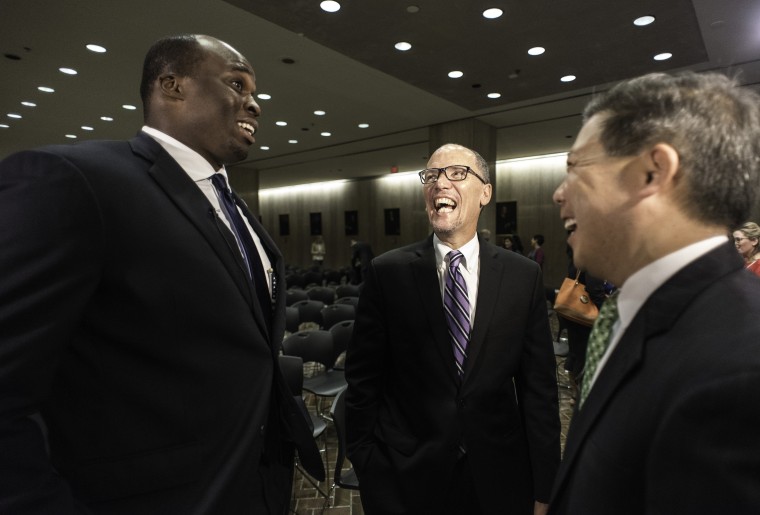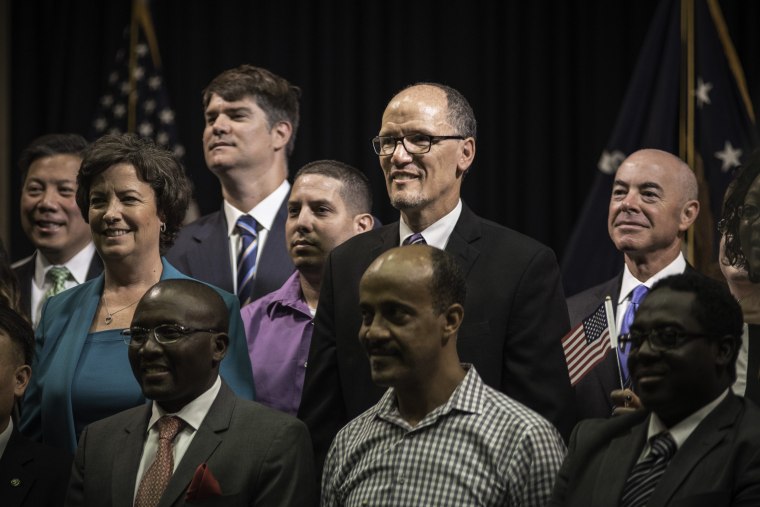Labor Secretary Tom Perez told NBC News in an exclusive interview that he has learned his grandfather publicly condemned Dominican Republic dictator Rafael Trujillo two years earlier than he knew, assuring him that his grandfather was on the right side of history during the bloody dictatorship.
Taking on reports that questioned his grandfather's role in Trujillo's regime, Perez called his grandfather, Rafael Brache, a “remarkably courageous man."
Perez spoke to NBC Latino just before delivering remarks this week at a naturalization ceremony. Perez sought to debunk questions raised in a Wall Street Journal article about Brache - whom he often evokes in his speeches. The article was published just as Perez’s prospects of being on the Democratic presidential ticket were at their highest.
“I was on the shortlist to being considered to be vice-president and you know what happens during that period of time is people look for hatchet things they want to do to you,” said Perez.
RELATED: VP Candidate or Not, Labor Sec. Tom Perez Touts Democrats' Job Record
He backed his view of his grandfather with archival documents his staff provided to NBC. Among other things, the documents in English and Spanish refer to his grandfather as “one of the leading enemies abroad of the Trujillo regime” and shows Brache was officially declared a traitor to the Trujillo government.
“The irony of that story is what it did for me is it caused me to dig even deeper into my grandfather’s courage and what I learned is he actually spoke out two years earlier than I thought,” said Perez, a voracious reader of history. His father also was born in the Dominican Republic, but Perez was born in the U.S.

Operating off of family stories, Perez had thought Brache first opposed the dictator when Trujillo ordered the slaughter in 1937 of tens of thousands of Haitians in the Dominican Republic.
But a series of other events preceding that protest already had him categorized as a political enemy of Trujillo, unable to return home because of a revoked passport and discussing ways to remove Trujillo.
Brache, who held various government positions before the U.S.-backed Trujillo took office, essentially was fired from his post as ambassador in late 1935 and was ordered to return to the Dominican Republic, which he didn’t do.
According to a British document unearthed by Perez's staff, he was dismissed "in the middle of November 1935 for alleged intrigues with his brother Dr. Elías Brache and Dr. Angel Morales." Morales was an exile in New York and one of the leading and more publicly vocal opponents of Trujillo.
By March 1936, Brache had resigned from the Dominican Party, according to the documents.
The Trujillo government rejected that resignation and reminded Brache he had been ordered returned to answer charges of being in communication with enemies of Trujillo, according to a March 16, 1936, state department cable. The government had wanted him to appear before a tribunal to answer the charges.
“It appears that the definitive entry of Señor Brache into the ranks of the political enemies of President Trujillo abroad is publicly marked by the enclosed exchange of letters,” diplomat H.F. Arthur Schoenfeld said in the cable.
That was followed by a March 25, 1936 cable that included a copy of an article written by a Trujillo government official about Brache's actions.The article, the American diplomat said, discussed “the political significance" of Brache's refusal to return to the Dominican Republic and resignation from the party.
“An attack of this nature coming from a source so near to the President of the Republic warrants the assumption that Sr. Brache is now regarded as one of the leading enemies abroad of the Trujillo regime,” the diplomat wrote.

A little more than a year later, the Dominican National Congress passed a resolution declaring Brache a traitor, according to a copy of congressional record of the Nov. 9, 1937 resolution.
The events brought an end to what had been several years of public service by Brache who also held various government positions before the U.S.-backed Trujillo took office.
"When he spoke out he still had family in the Dominican Republic. He had to make really difficult choices. Do I put my own family back home in danger? And he just couldn’t put a sock in his mouth any more," Perez said.
Perez pointed out that it wasn’t until 1960 that the Organization of American States expelled the Dominican Republic from the organization. “My grandfather was 25 years ahead of his time,” he said.
“It was just an unconscionable set of circumstances and an unspeakable set of circumstances. You see the person who you are serving, the country you love, is turning out to be a brutal thug and to speak out put your family members who are still living there in danger and so what do you do?” Perez said.
Experts on history of the Dominican Republic agreed with Perez, saying Brache took a serious risk by speaking out and opposing Trujillo.
Lauren Derby, author of “The Dictator’s Seduction” said Trujillo commanded a lot of respect at the start of his rule because he took power after a devastating hurricane and was effective in rebuilding the economy, although it came with a price. Although he eliminated political enemies at the start, the atrocities worsened over the years. Throughout many years of his dictatorship, he had U.S. support.
“In the 1930s there was a certain amount of popular support and it quickly deteriorated,” said Derby, an associate professor of history at the University of California Los Angeles.
Brache had worked on behalf of Trujillo's regime in those early years, negotiating with the U.S. on its debt and other matters. The Wall Street Journal cited State Department documents in which he defended Trujillo from attacks in the press and tried to persuade Morales to work with the government. However, even Eleanor Roosevelt visited the Trujillos in 1934.
In “The Dictator Next Door,” author Eric Paul Roorda includes Brache among exiles who “hatched plans for an invasion of the Dominican Republic and organized to condemn the Trujillo regime.”
Bernardo Vega, former president of the Dominican Academy of History and respected researcher on the Trujillo regime, said Perez’s grandfather is seen as a patriot in the Dominican Republic, even though he served in the first few years of Trujillo’s government.
Vega edited of a book of letters between Morales and American diplomat Sumner Welles, an adviser to Franklin Roosevelt. In letters from 1937 and 1942, written in Spanish, Morales mentions plotting by Brache to remove Trujillo.
“The fact that he served the first three or four years in the Trujillo government is not considered bad. He helped so much that the other exiles always praised him,” Vega said.
“When he resigned and he opposed Trujillo publicly and became a political exile, he lost his job and suffered as an exile for lack of money," Vega said.

Exile was not always safety for Trujillo’s opponents. It was well known Trujillo had henchmen in place to seek out his enemies abroad. In 1956, Trujillo critic Jesus Galindez was kidnapped off a New York street, returned to the Dominican Republic, tortured and killed.
Morales, the exile Brache worked with, was a target of an assassination attempt in 1935, but his roommate Sergio Benscome was killed when he was mistaken for Morales.
“The notion that you really couldn’t turn a corner without always having in the corner of your head somewhere, is there someone following me? Is there someone who has it out for me because I have spoken up and I’m proud of having spoken out and I see others murdered, in the United States by Trujillo?” Perez said.
Ramona Hernandez, director of the City College of New York Dominican Studies Institute said there were others who worked inside the Trujillo government who first tried to make change from within and later spoke out and also are resepcted.
The pain of the Trujillo regime still is deep in the Dominican Republic because of the thousands he killed, tortured or threw into poverty, Hernandez said. Those know to have supported him, “Dominicans will not let you sleep. You will get in trouble when you go there,” Hernandez said.
Perez was in the Dominican Republic for the August 16 inauguration of President Danilo Medina, getting some coverage in the Dominican press.
Perez has little actual memory of his grandfather, who died when Perez was 4. But as his speeches show, he is an influential part of his life.
"I find myself talking to him in my head a lot because I have the privilege of being in public service," Perez said. "I feel like the public service gene that has been passed throughout our family started with him."
